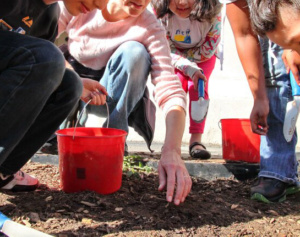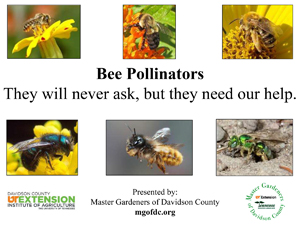Experts share the secret to encouraging roses to rebloom throughout the growing season.
By Madeline Buiano, Associate Editor, MarthaStewart.com
Meet the Experts
* Ron Daniels, Master Rosarian for the American Rose Society and author of Rose Therapy: My Journey of Growing and Caring for Roses
* Jeff Wyckoff, rosarian and former president of the American Rose Society
Provide Adequate Sunlight
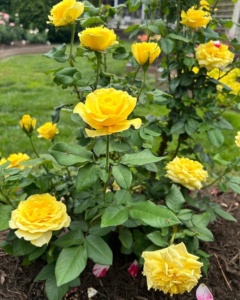 Roses need adequate sunlight to encourage blooming. “As a rule of thumb, we try to plant roses where they will get at least six hours of sunlight a day,” says Geraldine Mahoney, Master Rosarian for the American Rose Society, Pacific Southwest district. “In our area, that means an optimal spot would be where the roses get morning sun and afternoon shade.”
Roses need adequate sunlight to encourage blooming. “As a rule of thumb, we try to plant roses where they will get at least six hours of sunlight a day,” says Geraldine Mahoney, Master Rosarian for the American Rose Society, Pacific Southwest district. “In our area, that means an optimal spot would be where the roses get morning sun and afternoon shade.”
Water Properly
Avoid over- or under-watering your rose bushes—just the right amount will promote healthy growth for longer. “Roses need about 2 inches of water a week,” says Ron Daniels, Master Rosarian for the American Rose Society and author of Rose Therapy: My Journey of Growing and Caring for Roses. “The higher the temperatures the more they will need watering. Between 90 to 100 degrees Fahrenheit, water once a day.” Watering early in the morning is ideal. Daniels recommends using a drip water system with a timer to save water.
Fertilize Regularly
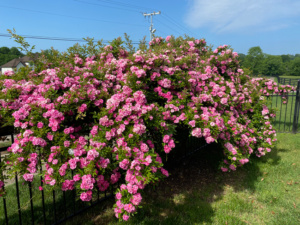 Keep roses blooming for longer throughout the growing season by applying a balanced fertilizer once or twice a month, depending on how the weather is in your area, says Mahoney. For example, when it is very hot, roses do not take up fertilizer as quickly so you can apply it less often. “Avoid fertilizing in the fall and allow the plants to begin shutting down for the winter,” says Jeff Wyckoff, rosarian and former president of the American Rose Society.
Keep roses blooming for longer throughout the growing season by applying a balanced fertilizer once or twice a month, depending on how the weather is in your area, says Mahoney. For example, when it is very hot, roses do not take up fertilizer as quickly so you can apply it less often. “Avoid fertilizing in the fall and allow the plants to begin shutting down for the winter,” says Jeff Wyckoff, rosarian and former president of the American Rose Society.
Prune in Spring
Major pruning is done in the spring to encourage growth. “The goal is cut all dead wood out of the bush and open up the middle of the bush so you have good air flow,” says Daniels. “This will help produce new canes that will produce rose buds.” Before pruning, check what the guidances are in your specific zone as timing may vary depending on what part of the country you live in.
Deadhead Regularly
In addition to pruning in spring, deadhead roses regularly throughout the growing season. “By cutting off the spent blooms the bush will produce new flowers,” says Daniels. “If you don’t do this they will produce a seed pod or hip and not a new rose. In most zones you will have three bloom cycles if you deadhead your roses.”
Ensure Proper Air Circulation
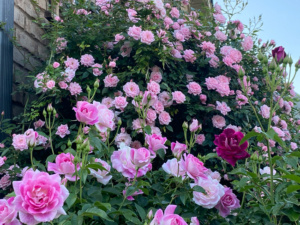 Roses need to be planted so there is plenty of room for proper air circulation, which ensures they have room to bloom. What’s more, proper spacing helps to keep diseases like powdery mildew in check and prevents insects from spreading through the garden. Mahoney recommends planting roses so the center of one bush is 3 feet apart from the center of the other in all directions. “We also try to keep a distance from the bushes to any walls or fences—this helps avoid reflected heat in the summer and lets the air circulate,” she says
Roses need to be planted so there is plenty of room for proper air circulation, which ensures they have room to bloom. What’s more, proper spacing helps to keep diseases like powdery mildew in check and prevents insects from spreading through the garden. Mahoney recommends planting roses so the center of one bush is 3 feet apart from the center of the other in all directions. “We also try to keep a distance from the bushes to any walls or fences—this helps avoid reflected heat in the summer and lets the air circulate,” she says
Inspect Roses for Pests and Disease
Regularly inspect your roses for signs of pests and disease, which can limit bloom longevity. “In our yard, we try to take our morning coffee and walk through the garden,” says Mahoney. “That walk gives us a chance to check if there are signs of insects, is the water system working, is there damage from any wind or weather that we need to address.” Treat pests and disease quickly to keep it from spreading to your other plants.
Plant Reblooming Roses
One of the most obvious ways to get your roses to bloom for longer is to plant reblooming varieties. “Most of the modern roses that are sold are remontant or reblooming,” says Mahoney. “If they are fed and deadheaded regularly, you should have roses blooming on and off throughout the season for your area.” Roses that are classed as “old garden” or “species” roses may or may not be rebloomers, but the plant tag at your nursery should indicate if they will rebloom.
Reprinted with permission by MarthaStewart.com
Madeline Buiano, Associate Editor at MathaStewart.com, contacted Ron Daniels, Nashville Rose Society Master Rosarian, along with Geraldine Mahoney and Jeff Wyckoff, with questions on how to keep roses blooming all season long. This article is a compilation of their answers.
Photo Credits: Ron Daniels Gadwall Abbey Garden

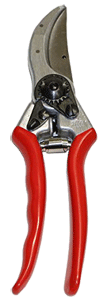 Baby, it is cold outside! It is a good time to get ready for the spring weather that will come to Middle Tennessee soon. One item that you may have on your TODO list is to sharpen your pruners. Ryan Amerg, General Manager of FELCO North America, joined Diane Summer, President of the American Rose Society, to teach us the basics for maintaining our pruners.
Baby, it is cold outside! It is a good time to get ready for the spring weather that will come to Middle Tennessee soon. One item that you may have on your TODO list is to sharpen your pruners. Ryan Amerg, General Manager of FELCO North America, joined Diane Summer, President of the American Rose Society, to teach us the basics for maintaining our pruners.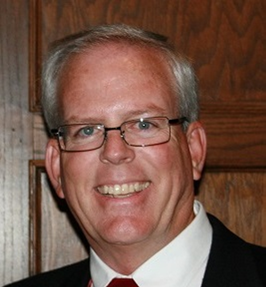 Have you ever tried rooting roses only to have them all die? Rooting roses is actually pretty easy.
Have you ever tried rooting roses only to have them all die? Rooting roses is actually pretty easy.